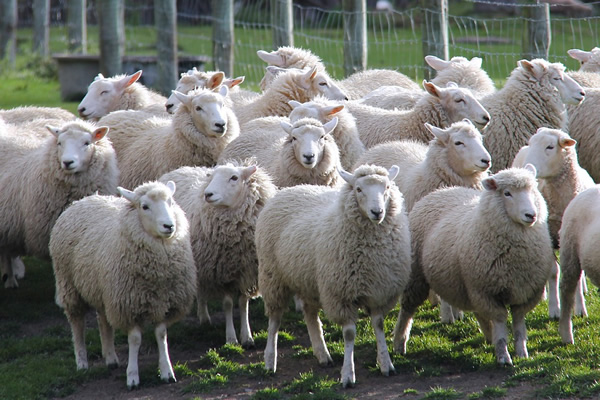WWOOFing in New Zealand
Volunteer Work on the Land and Meaningful Travel Harmonized
By David Zook

|
|
Get to know your sheep, cows, and permaculture with WWOOF in New Zealand. |
My work pays off when I sweep fine-grained sand in the narrow cracks between bricks. With the bricks now flush, the space looks polished and functional. I worked as a WWOOFer for almost a week in the small and lovely coastal village of Waitiati, just outside Dunedin on the South Island of New Zealand. I looked down on the brick patio, then across the ocean and Blueskin Bay, and concluded that WWOOFing is an altogether different travel experience than anything I have done in the past.
As a first-time WWOOFer, I was seeking something new. A bit weary of the tired (and expensive in New Zealand) hostel-to-hostel backpacking scene, my goal was to travel somewhere beautiful, meet interesting people, and learn a thing or two. I accomplished all that and more in less than a week while parting with virtually no money.
But the fact it worked out was not mere chance. A few wrong moves, and I could have been working with someone I did not get along with, doing work I hated, and regretting everything. Several key pre-planning steps heavily influence the WWOOF experience.
WWOOFing Essentials: Doing it Right
Know what you're getting into. While WWOOFing conjures images of working merrily on an organic farm in the country, the work involved varies enormously. Feeding chickens, making beer, cleaning hostels, chainsawing trees, and working for a surf school were all options in New Zealand. Even the word organic in the WWOOF acronym (World Wide Opportunities on Organic Farms) can sometimes be a misnomer, so only expect to learn about organic principles if that's in the description.
Grill your potential host. The farms are plentiful, so feel free to shop around for the right fit. Find out how much work is required, what the living arrangement is like, how much food is provided by the host, and what there is to do in the area, as these answers will give you an idea of what your life will be like. The closer you get to know the host, the better, as once you are on-site, there is much time spent together.
In return, I saw it as a sign of dedication to making the exchange work when my host — a friendly, energetic, and hospitable doctoral student — carefully described the work as unglamorous and hard. As a result, there were no surprises when I was continually hauling buckets of gravel up dozens of stairs and digging the hours away.
Half-Days Allow Plenty of Time to Explore
Life outside work is equally, if not more meaningful, than the work itself. According to their manual, most WWOOFers work 4-6 hours, meaning lots of free time is left to explore. Is there a town nearby? Will the host be working? Is public transportation available? Will you get bored? It boils down to the last question if you are on your own. I enjoyed lazy afternoons reading and hanging out with dogs and chickens. Still, if I had been there more than a week, I would have felt the need for either a companion or a change of venue. WWOOFing is an excellent option for couples or friends. By contrast, a solo traveler who is naturally very social needs company.
The Potential Beauty of the Exchange
WWOOFing can be a memorable exchange where both the host and the worker stand to gain greatly from each other. The host gets "free" labor, and the WWOOFer gets an enriched travel experience. From five half-days of work, I ate delicious home-cooked (and mostly home-grown) vegetarian food, strolled on stunning white-sand beaches, hiked in the hills, sipped a few pints at a hip Scottish bar in Dunedin, met fun, interesting folks, and learned about the vibrant community scene as well as the local environment.
In addition, WWOOFing is often a free educational experience — almost akin to an internship. Opportunities abound to learn about permaculture, sustainable farming, viticulture, and much more. Consider a more extended stay and seek out someplace that interests you. Assume it is specific knowledge that you are seeking. In that case, it helps to know that many hosts are happy to offer you a trial period with no hard feelings if you walk away after a few days. With a trial period, you will not find yourself potentially locked into "traditional farming practices," which involve living in a cold, dark barn and sleeping with the goats.
With the rise of WWOOFing worldwide, it is possible to hop from farm to farm, linking WWOOF stays and paying only for transportation. Stays are available in dozens of countries and in the world's most beautiful corners.
WWOOF offers a new option for the traveler with a love of exploring new options. Less committed than a full-time volunteer or work stint, with ample free time for vacation travel, but with the sense of cultural immersion as if living like a local, it can often offer all the finest aspects of traveling for those who are so inclined. Take some time to familiarize yourself with the organization and then, if it tempts you, take the plunge.
The WWOOF New Zealand website provides all you need to know.
See David Zook's article Living the Endless Winter in New Zealand’s South Island: Mid-recession Work and Travel in the Name of Fun for more.
|
